How fair do Americans believe their elections are? Do they think votes are counted properly, or that fraudulent mail-in ballots are cast? Will Americans accept the election outcome if their candidate loses?
There are some concerning signs that many US citizens have reservations about electoral integrity and no longer accept the legitimacy of candidates other than their own.
Since the 1970s, ideological polarisation has increased, widening the gap between the policy preferences of Republicans and Democrats.
Perceptions of poor electoral integrity and disputes about the legitimacy of the winner could create significant issues after the US election.
Since the winner can pass legislation, appoint judges to federal courts, and make executive orders as polarisation increases, the consequences of winning or losing a presidential election are significant. This was highlighted by the blocking of Barack Obama’s SupremeCourt nomination, moderate liberal Merrick Garland, by the Republican Senate majority nine months before the 2016 presidential election, and the appointment and confirmation of conservative Amy Coney Barrett by Republican President Donald Trump and the Republican Senate majority a week before the 2020 election.
Polarisation makes it difficult for Democrats and Republicans to negotiate, undermining governance through gridlock and lower quality legislation and limiting the ability of the executive and judicial branches to properly function. Affective polarisation (the tendency of Republicans and Democrats to view supporters of the other party negatively, and co-partisans positively) is also increasing. This impacts on voters' willingness to accept the legitimacy of the other side and elections won by their opponents.
Perceptions of poor electoral integrity and disputes about the legitimacy of the winner could create significant issues after the election. Law enforcement officials are bracing for problems after the election, with some groups ready for violence if the results do not go their way; although some research suggests widespread outbreaks of violence are unlikely.
To better understand Americans beliefs about how free and fair their electoral process is, and how the results of the 2020 presidential election will be received, the United States Studies Centre at the University of Sydney surveyed 1,500 Americans in early October 2020.
Key findings
These surveys found:
- Just 45 per cent of respondents who were voting for Republican Donald Trump agreed or strongly agreed that Joe Biden should be accepted as president if he wins the election, and only 31 per cent of Biden supporters agreed or strongly agreed that Trump should be accepted if he wins.
- Most Americans realise the other side does not accept their nominee. Only 16 per cent of Trump voters said Democrats would accept their candidate if he won, and 26 per cent of Biden supporters said Republicans would accept their nominee.
- Overall, supporters of the Democratic candidate are slightly more positive about the electoral system than Republican voters. However, this varied by different parts of the system. Supporters of Donald Trump were more likely to say voting would be easy or very easy (84 per cent), and were slightly less likely to say violence would occur very or fairly often (30 per cent). While most respondents who intended to vote for Joe Biden were considerably less likely to say that mail ballot fraud happened very or fairly often (fewer than 15 per cent), and somewhat more likely to say votes will be counted fairly (87 per cent).
- Respondents with more positive perceptions of how well the electoral system worked were more likely to agree that it should be accepted if the other party’s candidate wins, and more likely to believe the other party will accept their own nominee if they win. This suggests that more needs to be done to both secure the integrity of electoral systems and make sure Americans know this has been done. These results also highlight another problem caused by the very severe form of partisan polarisation currently gripping the United States.
Free and fair?
In general, Americans have concerns about the electoral process, but supporters of Republican President Donald Trump, and Democrat Joe Biden, differ on the nature of the problems.
As shown in Figure 2, respondents who said they were voting for Donald Trump in this year’s presidential elections were more likely to say that the voting process would be easy or very easy (84 per cent), that mail ballot fraud happened very or fairly often (71 per cent), but less likely to say votes will be counted fairly (70 per cent) and violence would happen very or fairly often (30 per cent).
Most Biden voters also said voting would be easy or very easy, but at a lower rate than Trump supporters (75 per cent). They were considerably less likely to believe that mail ballot fraud happened very or fairly often (fewer than 15 per cent), but somewhat more likely to say votes will be counted fairly (87 per cent), and fractionally more likely to say violence would happen very or fairly often (33).
Respondents who said they were voting for Donald Trump in this year’s presidential elections were more likely to say mail ballot fraud happened very or fairly often but less likely to say votes will be counted fairly and that violence would happen very or fairly often.
Respondents who were supporting third-party candidates, or those who did not intend to vote, were considerably less likely to say it was easy or very easy to vote (58 per cent) and more likely to say it was very difficult (12 per cent). Thirty-three per cent said mail ballot fraud happened very and fairly often, 65 per cent thought votes would be counted fairly very or fairly often, and 33 per cent thought voters were threatened with violence very or fairly often.
When examining these same questions by how voters intended to cast their ballots (or whether they would at all), respondents who did not intend to vote were more likely to say the process of voting was very or somewhat difficult (57 per cent). Those who had or were planning to vote by mail were more likely to say mail ballot fraud did not happen often at all (48 per cent), while those who planned to vote in person on the day were more likely to say it happened very often (27 per cent). Very few (seven per cent) of respondents overall thought voters would be threatened with violence very often. This was highest among non-voters and those who were voting by mail (10 and eight per cent respectively). Those who planned to vote on the day were less likely to think this (with 26 per cent of these respondents saying it did not happen at all often).
Overall, supporters of the Democratic candidate are slightly more positive about the electoral system than Republican voters. As can be seen in Figure 3, on a scale of 0 to 1, where zero is a respondent who believes voting will be difficult, mail ballot fraud and electoral violence are frequent, and votes will generally not be counted fairly, while those with a score of one say the opposite, respondents who say they are voting for Democrat Joe Biden have a mean score of 0.6, compared with 0.43 for Trump supporters and 0.45 for those voting for third-party candidates, or not at all.
Figure 1. American voters' perceptions of electoral integrity, by their own preferred candidate
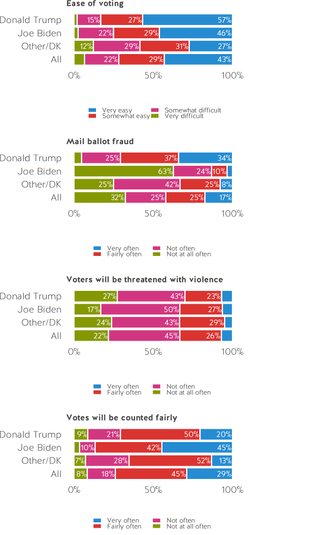
Figure 2. American voters' perceptions of electoral integrity, by the method used to vote
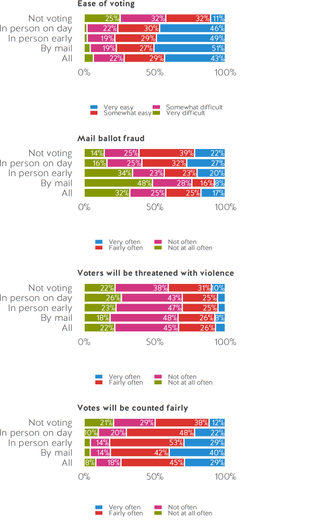
Figure 3. Distribution of perceptions of electoral integrity, by voters' preferred candidate. A score of 1 on this measure of electoral integrity indicates respondents believe voting is very easy, mail ballot fraud does not happen, voters will very rarely be threatened with violence, and votes will be counted fairly. A score of zero indicates they believe the reverse is true.
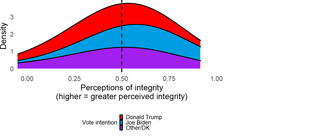
Presidential legitimacy: Will the results be respected?
These different attitudes towards electoral integrity have consequences for perceptions about the legitimacy of the election. One of these is that the other party’s candidate is seen as lacking legitimacy, and with many Americans believing that the supporters of the other party will not accept their own nominee as president. This view is evident in our data, with fewer than half of Americans agreeing or strongly agreeing that no matter who wins the presidential election, all Americans should accept him as the president.
To measure whether Americans would accept the other party’s candidate as the president, or if they thought the supporters of the other party would support their own candidate, we asked two questions with different wording for Republicans and Democrats (see the wording of questions below).
We asked respondents who were voting for Donald Trump to agree or disagree with the following statement: ‘If the Democratic candidate Joe Biden wins the presidential election in November, all Americans should accept him as the president.’ Only 45 per cent agreed or strongly agreed with the proposition (see Figure 4). We asked supporters of Joe Biden to agree or disagree with the following statement: ‘If the Republican candidate Donald Trump wins the presidential election in November, all Americans should accept him as the president’. Even fewer, 31 per cent, agreed or strongly agreed. We asked all other respondents: ‘No matter who wins the presidential election in November, all Americans should accept him as the president.’ A slim majority, 58 per cent, agreed or strongly agreed.
Fewer than half of Americans agree that no matter who wins the presidential election, all Americans should accept him as the president.
Most Americans also realise the other side does not accept their nominee. We asked Republicans, and a random selection of third-party and non-voters: ‘If the Republican candidate Donald Trump wins the presidential election in November, do you believe Democrats will accept him as the president?’ We then asked Democrats, and all other third-party and non-voters: ‘If the Democratic candidate Joe Biden wins the presidential election in November, do you believe Republicans will accept him as the president?’ Only 16 per cent of Trump voters said Democrats would accept their candidate if he won. Almost two-thirds said they would not. A slightly larger, but still low 26 per cent of Biden supporters, said Republicans would accept their nominee, with 40 per cent saying they would not.
These responses are associated with perceptions of how well the electoral system worked. Shown in Figure 5, regardless of whether or how they intend to vote in the 2020 presidential election, respondents with more positive perceptions of the electoral system were more likely to agree that it should be accepted if the other party’s candidate wins, and are more likely to believe the other party will accept their own nominee if they win.
These findings indicate that work needs to be done securing the US electoral system and Americans trust in their institutions of government. They also highlight another potential issue caused by the very severe form of partisan polarisation that has emerged in the United States in recent decades and indicate that political tensions observed in recent years will likely not disappear any time soon.
Figure 4. The legitimacy of the winner of the presidential election, by respondents’ preferred candidate
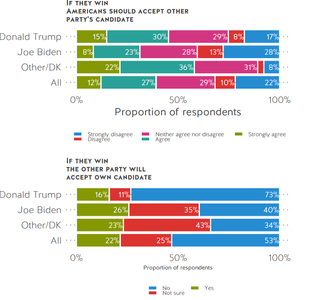
Figure 5. Mean score on perceptions of electoral integrity by views on the legitimacy of the winner of the presidential election and respondents’ preferred candidate. A score of 1 on the measure of electoral integrity indicates respondents believe voting is very easy, mail ballot fraud does not happen, voters will very rarely be threatened with violence, and votes will be counted fairly. A score of zero indicates the reverse.
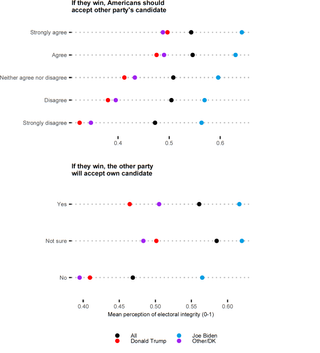
About the survey data
The survey was fielded between 13-19 October 2020, by YouGov, a global public opinion and data company. The sample of 1,500 respondents was drawn from YouGov panels of respondents who have previously agreed to take surveys online.
This sample was formed by first segmenting the YouGov US panel on gender, age, race, and education, matching the distributions of those variables in the adult, citizen population of the United States provided by 2016 American Community Survey 1-year sample. Randomly selected panellists in each segment were invited to take the survey. After data collection, the responses were weighted to match the distributions of age, gender, race, education and vote choice at the 2016 presidential election (based on official vote tabulations).
The maximum margin of error for each data set is approximately ±3 percentage points. It is larger for differences for population subgroups within the samples.
Questions asked
Overall, do you personally expect voting in the November elections to be:
Single select; random reverse scale 1-4
- Very easy
- Somewhat easy
- Somewhat difficult
- Very difficult
Thinking about the presidential election this year, how often will the following occur?
Rows; randomise options
- Mail ballots will be cast by people impersonating other voters (voter fraud)
- Eligible voters will be threatened with violence when they go to vote
- Votes will be counted fairly
Single select; grid; columns; random reverse scale 1-4
- Very often
- Fairly often
- Not often
- Not at all often
If respondents said they were voting for the Republican candidate, Donald Trump:
Do you agree or disagree with the following statement?
If the Democratic candidate Joe Biden wins the presidential election in November, all Americans should accept him as the president.
Single select; random reverse scale 1-5
- Strongly agree
- Agree
- Neither agree nor disagree
- Disagree
- Strongly disagree
If respondents said they were voting for Democratic candidate, Joe Biden:
Do you agree or disagree with the following statement?
If the Republican candidate Donald Trump wins the presidential election in November, all Americans should accept him as the president.
Single select; random reverse scale 1-5
- Strongly agree
- Agree
- Neither agree nor disagree
- Disagree
- Strongly disagree
If respondents said they were voting for a third-party candidate, or not at all:
Do you agree or disagree with the following statement?
No matter who wins the presidential election in November, all Americans should accept him as the president
Single select; random reverse scale 1-5
- Strongly agree
- Agree
- Neither agree nor disagree
- Disagree
- Strongly disagree
If respondents said they were voting for the Republican candidate, Donald Trump:
If the Republican candidate Donald Trump wins the presidential election in November, do you believe Democrats will accept him as the president?
Single select; random reverse scale 1-2
- Yes
- No
- Not sure
If respondents said they were voting for Democratic candidate, Joe Biden:
If the Democratic candidate Joe Biden wins the presidential election in November, do you believe Republicans will accept him as the president? If Q6 a or b == 2 Democratic/Biden, use this
Single select; random reverse scale 1-2
- Yes
- No
- Not sure
All other respondents were randomly allocated one of the two previous stems.







